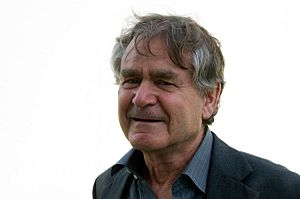Ian Hacking facts for kids
Quick facts for kids
Ian Hacking
|
|
|---|---|

Hacking in 2009
|
|
| Born | February 18, 1936 Vancouver, British Columbia, Canada
|
| Died | May 10, 2023 (aged 87) |
| Alma mater | University of British Columbia Trinity College, Cambridge |
| Era | 20th-century philosophy |
| Region | Western philosophy |
| School | Analytic philosophy |
| Doctoral advisor | Casimir Lewy |
| Doctoral students | David Papineau |
|
Main interests
|
Philosophy of science Philosophy of statistics |
|
Notable ideas
|
Entity realism Historical ontology (transcendental nominalism) |
|
Influences
|
|
|
Influenced
|
|
Ian MacDougall Hacking (February 18, 1936 – May 10, 2023) was a famous Canadian philosopher. He focused on the philosophy of science, which is about understanding how science works and what it means. Throughout his life, he received many important awards, like the Killam Prize and the Balzan Prize. He was also part of special groups, such as the Order of Canada.
Contents
Ian Hacking's Life and Career
Ian Hacking was born in Vancouver, British Columbia, Canada. He went to the University of British Columbia and then to the University of Cambridge in England. He earned his PhD degree at Cambridge in 1962.
Hacking started teaching at Princeton University in 1960. He then taught at several other universities, including the University of Virginia and his old school, the University of British Columbia. In 1974, he moved to Stanford University. Later, he became a top professor at the University of Toronto in Canada. From 2000 to 2006, he held a special teaching position in France at the Collège de France. He was the first English-speaking person to get this permanent job there. He finished his teaching career as a visiting professor in South Africa.
Ian Hacking passed away on May 10, 2023, when he was 87 years old.
Ian Hacking's Ideas on Science
Ian Hacking was known for looking at the history of science to understand it better. He was part of a group of thinkers called the "Stanford School" in the philosophy of science. He also called himself an "analytic philosopher" from Cambridge.
One of his main ideas was "entity realism." This means he believed that the things scientists discover, like tiny particles or forces, are real. However, he was careful about believing that all current scientific theories are completely true. He also thought that doing experiments and building scientific tools were very important parts of science, not just theories.
After 1990, Hacking started looking more at human sciences, like psychology and sociology. He was influenced by another philosopher named Michel Foucault.
In his book Mad Travelers (1998), Hacking wrote about a strange medical condition from the 1890s called "fugue." People with fugue would walk for hundreds of miles in a trance, not knowing who they were. Hacking explored how this condition was understood and treated over time.
Awards and Special Lectures
Ian Hacking received many honors for his work. In 2002, he won the first Killam Prize for the Humanities, which is Canada's highest award for achievements in this field. He was also made a Companion of the Order of Canada in 2004, a very high honor in his home country.
In 2009, Hacking won the Holberg International Memorial Prize. This is a major award for important scholarly work in arts, humanities, social sciences, law, and religion. He also gave many special lectures at universities around the world, sharing his ideas. In 2014, he was awarded the Balzan Prize.
Selected Books by Ian Hacking
Hacking's books have been translated into many languages. Here are some of his works:
- The Logic of Statistical Inference (1965)
- A Concise Introduction to Logic (1972) ISBN: 039431008X
- The Emergence of Probability (1975)
- Why Does Language Matter to Philosophy? (1975)
- Scientific Revolutions (1981) ISBN: 019875051X
- Representing and Intervening, Introductory Topics in the Philosophy of Natural Science (1983)
- The Taming of Chance (1990)
- Rewriting the Soul: Multiple Personality and the Sciences of Memory (1995)
- Mad Travelers: Reflections on the Reality of Transient Mental Illnesses (1998)
- The Social Construction of What? (1999)
- An Introduction to Probability and Inductive Logic (2001)
- Historical Ontology (2002) ISBN: 9780674016071
- Why Is There Philosophy of Mathematics at All? (2014) ISBN: 9781107050174
See also
 In Spanish: Ian Hacking para niños
In Spanish: Ian Hacking para niños
 | Delilah Pierce |
 | Gordon Parks |
 | Augusta Savage |
 | Charles Ethan Porter |

